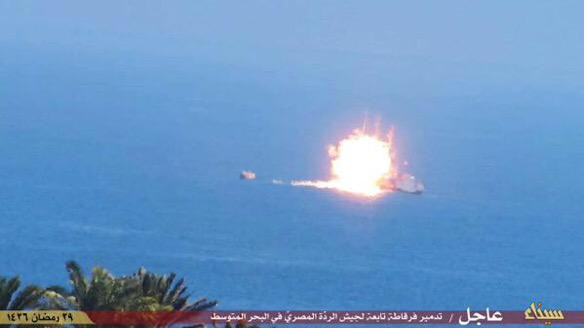Isis in the Sinai claims Egypt's vessel 'rocket attack and destruction'

The Islamic State (Isis)'s offshoot in Egypt – the Sinai Province – claims it launched a rocket and destroyed an Egyptian Navy frigate in the Mediterranean sea.
The IS affiliate released pictures of what it said was a guided anti-tank rocket attack on the vessel off the coast of northern Sinai, in Rafah, an area bordering Israel and the Gaza strip. The Egyptian military said it exchanged fire with militants off the coast and the boat caught fire, but there were no casualties as result of the incident. It did not mention that the boat was destroyed.
Big - Official #IS statement claims a rocket attack targeted an Egyptian Navy Frigate in the Mediterranean: pic.twitter.com/31Qvq1V5Fr #Egypt
— Charles Lister (@Charles_Lister) July 16, 2015
An official IS statement boasted online that the naval attack was the first of its kind and the start of maritme operations in the Mediterranean. A witness, fisherman Abu Ibrahim Mohammed from Gaza, said the vessel was a gunboat that was sailing at a nautical mile off the coast when it caught fire – but the man did not hear the explosion. Later, he saw two smaller boats trying to extinguish the fire. A third boat came and towed the vessel away. He also heard gunshots.
The vessel was tasked with patrolling Egyptian territorial waters and has been used to move army and police personnel to Egypt. According to terror expert Charles Lister, IS probably used an anti-tank guided missile for the attack similar to the ones used in the Sinai.
IS has stepped up its operations in Egypt, killing at least 17 soldiers in a July assault. Last week, the group took credit for a bomb attack in front of the Italian consulate in central Cairo, in which one person was killed. Another IS attack killed Egypt's state prosecutor Hisham Barakat.
IS in the Sinai
The Sinai has long been a hotbed of political instability, particularly in the north-east near Egypt's border with Gaza and Israel.
Local Bedouin tribes claim that they have been neglected as the government has developed Sinai as a tourist hotspot in cities like Sharm el-Sheikh.
That anger has increasingly found its voice in radical Islam, especially in the wake of the crackdown on the Muslim Brotherhood by the government of General Abdel-Fattah al-Sisi.
IS-affiliated Ansar Bayt al-Maqdis (ABM) has been able to build wealth from trade via illegal tunnels between Gaza and Rafah, which not only funded the militant activity of Salafist jihadist groups, but also created a new class system in Sinai relative to the power of tribes in north Sinai.
As a result, previously less powerful tribes and clans in north Sinai began to have more influence, defying the old and major tribes and their arrangement with Egyptian authorities and forming their own independent council.
That shifting of the balance of power – away from tribes willing to cooperate with Cairo and towards those who are opposed to it – suggests that Egypt's war against radical Islam has only just begun.
© Copyright IBTimes 2025. All rights reserved.






















